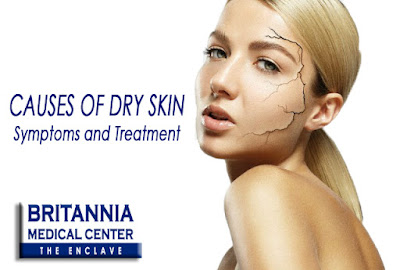Causes of Dry Skin: Symptoms and Treatment
Most of us love winter as it is a time for festivals, picnics and lots of other outdoor activities. But it also marked with dry and rough weather, when most of us suffer from dry skin problems, cracking of heels, dry lips and so on. Dry skin makes your skin look dull and unhealthy. Because of the lack of moisture in the skin, you will suffer from itching and irritation of the skin. So, it is important that you keep your skin well moisturized throughout the day to prevent the skin from getting dry. This way you can keep your skin hydrated and in good condition.
There are many reasons that cause dry skin. It can be due to environmental reasons as well as hereditary conditions. So, first you have to diagnose what caused dry skin. Once you know the cause for dry skin, you can take measures to treat the skin and nourish it, so that it becomes healthy and well nourished.
Dry Skin Symptoms and Treatment:
There are many causes for dry skin. One thing to remember is that when you have dry skin, you must always keep your skin well moisturized. Some of the reasons for dry skin and treatment for it are:
Ageing:
With age, your skin becomes saggy and drier. You lose the elasticity of the skin and your skin starts to get mature. So, you have to start applying anti-ageing products on your skin. This helps in keeping your skin hydrated.
AC:
Air conditioner is another reason for your skin becoming dry. When you spent a few hours in an air-conditioned room and then come out, you feel dryness in your skin. The skin on your face seems to become stretched as well as itchy. So, if you spend long hours in air-conditioned rooms, apply a good nourishing cream on your skin. When there are cooling or heating devises in your room like air-conditioners, room heaters, fireplaces and coolers, the humidity in that room will be very low. As a result the moisture from your ski is absorbed by the surroundings and your skin becomes dry and itchy.
Excessive exposure to sun:
When your skin is exposed to sun for a long time, the sunrays penetrate deep in to the skin and dissolve the bonds of collagen and elastin. This makes the skin lose its firmness and also makes it dry. Wrinkling and sagging of the skin are other effects of exposure to sun. By applying a good sunscreen lotion you can prevent these problems.
Frequent showers:
If you have a habit of taking a shower frequently with hot or warm water, you skin starts getting dry. This is because the heat from the water takes away the moisture from the upper layer of your skin, which is responsible for retaining he moisture in the skin. Moreover, the soap that you use also makes your skin dry. As a result, you will suffer from dry and itchy skin.
Improper intake of water:
You do not feel very thirsty in winter ad so you do not drink too much of water. This can make yourskin dry and dehydrated.
Low levels of moisture in the surroundings:
Most common reason for dry skin is the environmental changes. When there is less humidity in the surroundings, your skin tends to become dry. So, if your body is exposed to extreme temperatures or less humid environment, your skin becomes dry. Low temperature and low humidity are the two main reasons for your skin to become dry as well as itchy. In desert regions, the temperature is high but there is very little humidity in the surroundings. Such a condition makes your skin even worse. You can prevent dry skin under such conditions by installing humidifiers in your house.
Low secretion of thyroid hormones:
When there is a decrease in the secretion of thyroid hormones, you may suffer from dry skin. This is because low secretion of these hormones decreases the activities of oil and perspiration glands and thus leads to a dry skin.
Soaps:
Commercial soaps, especially the antibacterial soaps, are harsh on our skin and make the skin dry. The chemicals present in soaps remove all moisture from the skin, leaving your body dry and itchy. So, it is better to use body wash instead of using soap to clean your body. It is a good idea to apply oil on your skin before you take bath. This will keep your skin hydrated and prevents dryness. After you use a mild soap or a face wash, you must always apply a moisturizer on your skin.
Symptom of diabetes:
Dry skin can be an early symptom of diabetes. People suffering from this disease tend to have dry hands and feet. So if you have such a symptom, you must check your sugar level and see whether you are suffering from this disease.
Swimming for long hours:
Swimming for hours in the swimming pool can have adverse affects on your skin and your hair. When you swim for a long time in the pool, the outer layer of epidermis, which plays an important role in retaining the moisture, is depleted. The chlorine present in water breaks the lipid barriers in the skin and thus makes your skin harsh and arid. So you have to apply a good quality nourishing cream before you step into the swimming pool. This way you can protect your skin from various skin problems caused by chlorine present in the water and keep your skin hydrated and healthy.
Shampoos and conditioners:
The skin of the scalp is very delicate and vulnerable and it dries faster than the skin on any other part of your body. So, when you use harsh shampoos and conditioners that contain lots of chemicals in them, your hair and scalp become dry. Use shampoos and conditioners that are made for dry scalp and thus prevent dry scalp. You can also use herbal and homemade shampoos and conditioners as they do not contain chemicals and suit all types of scalp.
For
more information make an appointment by
calling 0925-567-5329 • 0908-865-5662 • 0917-566-1932 • 458-0717 and
schedule a consultation today.
Visit us at BRITANNIA MEDICAL CENTER - The Enclave





